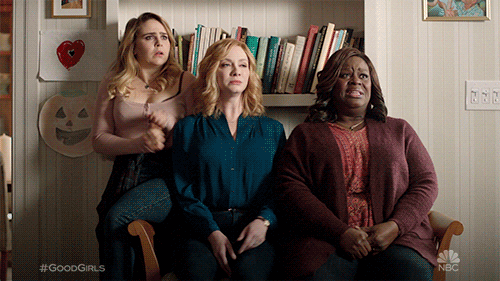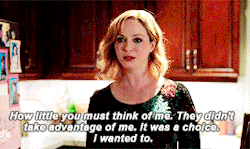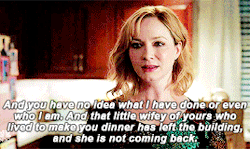(Image credit: NBC)
Women are expected to be everything.
We’re supposed to be smart, kind, and tough (but not too tough), funny, beautiful, trendy, thin, cellulite-free, and wrinkleless. But perhaps the most dangerous thing a woman is expected to be is likable. When unlikable female characters grace television screens men and women alike don’t quite know how to handle them, especially if they’re not outright villains. Critics take to social media and blogs demanding that the female characters meet their expectations.
But what if female characters don’t have to be likable to be good?
What if they can be problematic instead?
As you might have guessed from the title of this post, we’re going to be talking about antiheroes. Traditionally, you’re used to seeing male antiheroes on television (Breaking Bad’s Walter White is one of the most oft-referenced recent examples) — an antihero is, by definition, the protagonist of the story but someone who lacks heroic qualities. They might do morally decent things from time to time, but they might not be for the right reasons. And, traditionally, an antihero will make you question whether you’re supposed to be rooting for them in the first place.
That’s kind of the joy of well-written characters, in my opinion. I don’t want clean-cut heroes who always do the right thing; people are, realistically, far more morally grey than they are black and white. So if a character makes a choice that is within the scope of their characterization, habits and patterns, and fits with their journey (all of those are key) but it isn’t a “good” one, I’m usually more inclined to be drawn to them.
I think there’s a deep fear within writers to construct antiheroes who are women. And I think that’s why shows try to make their female characters either the clear-cut, morally conscious, and generally “good” women — who tend to serve as angels on the shoulders of male protagonists — or just straight-up villains. Not many shows take risks by presenting unlikable women whose personalities are more abrasive than inviting, and who tend to make bad decisions with self-focused moral justification (while still having sympathetic character traits). But when shows can present female antiheroes well, they have the opportunity to really thrive.
One of the most recent shows to portray a dynamic female antihero with skill is NBC’s Good Girls.
Note: Spoilers for the series will follow!

“GOOD” GIRLS
This NBC drama follows a trio of women — Beth, Annie (Beth’s sister), and Ruby — who are struggling financially. Beth’s husband has cheated on her and gotten their family into serious financial trouble. Annie is a single mother trying to make ends meet with a grocery store gig. And Ruby’s a working mom who’s desperately trying to support her family, including medically caring for a daughter who has kidney disease. The women are desperate, and when they hatch a plan to rob the store that Annie works at, they do so because they feel like they have no options left. No extra shifts or job will help cover the holes they’re buried under. And they justify their decision — no one will get hurt, they’ll use fake guns, and they won’t get caught. It’ll be one job, then they’re done.
Unfortunately, things don’t quite go as planned. Not only does Annie get recognized but the women realize the money they stole actually belongs to a gang, led by a man named Rio. He wants his money and that’s how three mothers get involved with a gang. The curious thing — and most interesting — is to explore how each woman has developed, morally, since the show’s pilot.
Obviously in this post I want to talk about who I view to be the series’ primary antihero (Beth), but in order to do that we need to talk about how each of these women began their journeys.

ANNIE IS GREAT
Moreover, Annie really does also have a heart. She can joke with gang members and make rapid-fire sarcastic comments but she cares deeply about the people around her. She loves her sister. She loves her child. She loves her friends. But she also spends time with an elderly woman because she feels so guilty for something that the woman doesn’t know about (and that Annie didn’t technically do). That is who she is.
Annie’s also the kind of person who’d do whatever it takes to protect and keep Sadie, her child. Since Annie had Sadie when she was a teenage, Annie and he are close. Really close. In a lot of ways, they take care of each other instead of presenting a traditional mother/child dynamic. But there comes a tipping point in this season of Good Girls where Annie and Sadie’s relationship fractures because of Annie’s moral choices. Annie isn’t exactly a cut-and-dry antihero; while she does make mistakes, she ultimately does the right thing most days. She has a line she will not cross, and a set of standards she adheres to. Her decisions aren’t always morally upright, but she’s doing them because she feels she has no options. I don’t think she’s truly an antihero.
Unlike Beth (who we’ll discuss later on), Annie and Ruby have made choices in Good Girls that put themselves and their own interests on the line for the sake of doing what is “right.” Annie comes clean to Sadie about something she’s been hiding, and Ruby decides to talk to Detective Turner and offer him information about Beth in order to save her husband, Stan. And speaking of Ruby...

RUBY’S PRIORITIES
Ruby is the one in the group who has the most on the line in a lot of ways. She has a husband who’s a cop. She’s got two kids, one of whom has kidney disease and medical bills that pile up. And she’s willing to do whatever it takes to protect her family. However, Ruby and Stan’s relationship is what sets her apart from the other women in the group. While Beth is still technically married, she’s more or less still married to Dean for the sake of convenience instead of love; Annie has a complicated relationship with her ex and a new one with her boss, Noah (who she doesn’t know yet is actually an undercover agent).
Ruby is willing to sacrifice herself, her own interests, and Beth (though she doesn’t pull the trigger, she did think briefly about turning in Beth’s whole operation) because there’s nothing she wouldn’t do to save her husband. She knows how great of a man she is — and he is such a great guy and husband — and it’s that kind of love that leads both of them to make sacrifices and sometimes bad decisions for the sake of one another. Ruby is also the one of the group who’s come clean to her significant other about everything — everything the women have done, from start to finish, that’s been illegal or illegal adjacent.
Stan, of course, had to catch Ruby in a lie in order for this all to come to light. Still, she tells him what she’s done because she weighed the cost — she couldn’t gain the money and resources for her family but lose her family in the process. Ruby is such a fantastic character because she’s layered (again, she returns to illegal activities in order to try and save her husband from jail), passionate, and a caretaker for the women. Retta does an amazing job conveying each of these layers with precision and empathy.
Ruby’s generally the one of the group who’s most uncomfortable with lying — even making a joke about how Beth mentioning a new plan gives her hives — and the exploits, unless she can justify them. While both Annie and Ruby lie repeatedly and compulsively throughout the series to people, neither of them do it so deftly and with skill like Beth.

AN ANTIHERO TO ROOT FOR (SOMETIMES)
Beth has spent her life being looked at as “just” a housewife and mother — and her husband is included in that group of people. Dean cheated on Beth with multiple women, got their family and his business into financial ruin, and refused to see Beth as his equal or partner. He doesn’t respect her, and Beth spent her life being okay with that. When you’re not used to having power, you easily slide into mediocrity. Beth was content to make sandwiches for her kids, snacks for sporting teams, and pick up kids in carpool. She coasted. She was fine.
Until she realized how much trouble her family was in. They were going to lose their house, their stuff, their ability to provide for their children. Beth’s children ultimately are what drive her throughout some of her decision-making. The other thing — the main thing — that drives Beth though is power.
When you’re not used to having power — when people around you, including your own husband have denied you of your agency and reduced yoru identity to nothing — acquiring it is life-changing. It can be used for good. Or... well, not. I’m not saying Beth isn’t genuinely motivated in instances by her children. It, however, is what all three women tell themselves to justify their behavior. If Beth says she’s gotten into bed (literally and figuratively) with Rio because she needs to right the financial wrongs Dean made because she wants to protect and provide for her family, she sounds noble. If she says she’s done all of it because she loves the rush of being in control, of being in power, of being at the top… well, then she’s an antihero.
And that’s exactly what I love about her.
Because the truth is that Beth really does do all of this because she wants to reclaim the power she’s lost over the years. In some ways, you can empathize with her struggles (and Christina Hendricks truly is a force to be reckoned with when she gets the chance to unleash the full range of Beth’s emotions).
But this is where antiheroes get sticky — can we empathize with all of Beth’s decisions? The funny thing is that Beth is so good at lying, at manipulating, at bending people to do what she wants, at covering her tracks, at thinking ten steps ahead, at playing the game... that she doesn’t want to give it up.
Who would she be if she went back to being a housewife and mother? Would she be okay with giving up her power for the sake of her family? “One Last Time” told us that Beth would be leaving a life of crime. She had one last hook-up with Rio, and seemingly said goodbye. I don’t know about you but I’m not sure that will stick. Not only because Rio and Beth have insane chemistry and she won’t be able to stay away, but because Rio knows Beth has tasted power and that she’s not going to handle returning to a life without it easily.


Power is like a drug for Beth. She’s willing to do whatever it takes to get it. She brings her children with her to scope out a house for a drug delivery. She rushes to check on her money when her house is robbed instead of checking on Dean. She lies and justifies and blackmails and makes promises because she’s good, really good, at what she’s doing. There’s a reason she’s the leader and it’s because she’s embraced her role as an antihero.
She justifies her decisions but at the end of the day, most of what Beth does isn’t morally upright and she’s kind of okay with it as long as she continues to benefit. Now, Beth is also a sympathetic character — she’s a woman who’s been wronged, repeatedly, by a man and has children — and because of that, she’s the perfect antihero. The line between “hero” and “villain” with her shifts with every decision she makes. Is she truly doing something for her kids? Or is she doing it because it makes her feel good? Is she lying because she feels like she has no other choice? Or because she knows she’s just good at it and can get away with it?
Good Girls doesn’t ask us to decide whether Beth is right or wrong. There are characters throughout the series who have their own opinions, and we’re asked to frame our perception of her decisions through their interpretations, as well as our own. Agent Turner thinks she’s a villain and wants to take her down. Annie and Ruby think she’s in deep but that ultimately she’s a good person (that scene where Dean takes the kids is, again, a sympathetic one). Rio respects her — something she’s never had from her own husband — and thinks she’s incredibly capable.
But how do you feel about Beth? Is she a good girl? Or is “good girl” her cover? And what about Annie? Ruby?
Good Girls is such a compelling show for a variety of reasons — it’s funny, dramatic, fast-paced (I binge-watched the first season in less than a day; I have no regrets) — but chief among them is its portrayal of complex, nuanced female characters who aren’t always likable and aren’t always right. They live and thrive in morally grey areas and that’s pretty great to see. It’s up to us to decide whether they’re the heroes or antiheroes of their own stories.
I’m just happy to be along for the ride.






0 comments:
Post a Comment